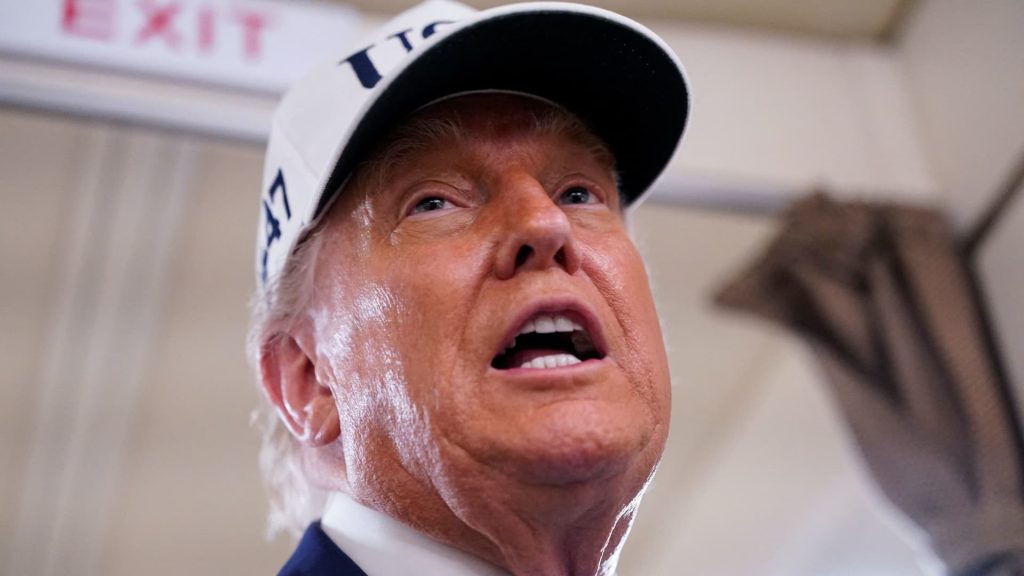In a significant development surrounding immigration enforcement, President Donald Trump addressed the case of Kilmar Abrego Garcia, a Maryland resident recently returned to the U.S. from El Salvador after being mistakenly deported. During a phone interview, Trump stated that the decision to bring Abrego Garcia back was made by the Department of Justice. This case has highlighted ongoing tensions regarding immigration policy and due process in the U.S., with political figures like Sen. Chris Van Hollen condemning the treatment of Abrego Garcia, while state officials accuse him of being involved in smuggling activities.
| Article Subheadings |
|---|
| 1) Background on Kilmar Abrego Garcia’s Deportation |
| 2) Presidential Statements and Political Fallout |
| 3) Legal Implications and Attorney General’s Comments |
| 4) Reactions from Abrego Garcia’s Supporters |
| 5) Broader Context of Immigration Policy |
Background on Kilmar Abrego Garcia’s Deportation
Kilmar Abrego Garcia’s case began when he was deported to El Salvador under circumstances that have since been labeled an “administrative error” by officials in the Trump administration. Garcia, who claimed he had legal protection against deportation, was sent away mistakenly after being detained. This incident escalated into a complex legal battle, attracting attention from human rights advocates and legal experts who champion due process rights. After several months of deliberations, the matter reached the U.S. Supreme Court, which ultimately ruled that the administration was required to facilitate his return to the country.
Presidential Statements and Political Fallout
During a phone call with NBC News, President Trump emphasized that he was not personally responsible for bringing Garcia back, stating, “The Department of Justice decided to do it that way, and that’s fine.” He remarked on the ease with which he believed federal prosecutors would handle the case, indicating a strong position against Garcia, whom his administration alleges is involved in criminal activities associated with the gang MS-13. Trump’s comments have drawn ire from political opponents, particularly Sen. Chris Van Hollen, who criticized the administration’s judicial approach and the broader implications for immigration policy. Trump did not engage with Salvadoran President Nayib Bukele about Garcia’s return, despite previous discussions on the issue.
Legal Implications and Attorney General’s Comments
Following Garcia’s return, Attorney General Pam Bondi made bold claims regarding Garcia’s activities, alleging he was a human smuggler responsible for trafficking numerous individuals, including women and children, across the nation. “He made over 100 trips,” Bondi stated, underscoring Garcia’s supposed criminality. These comments further polarized the discourse surrounding the case, with the administration framing Garcia as a member of a notorious gang while simultaneously stressing the need for strict immigration laws. However, Garcia’s legal counsel described the allegations as an “abuse of power, not justice,” suggesting that the prosecution was politically motivated rather than based on legal principles.
Reactions from Abrego Garcia’s Supporters
Supporters of Kilmar Abrego Garcia, including his family and legal representatives, have vehemently defended his character and legal rights. They have labeled him a “family man,” countering the administration’s narrative that suggests he is a dangerous criminal. The public’s reaction has been split, with critics accusing the administration of using Garcia’s case as a tool to bolster their hardline immigration stance. Prominent political figures, particularly Democrats, have expressed concern over what they perceive as due process violations in Garcia’s initial deportation. Senator Van Hollen’s visit to Garcia in a Salvadoran jail further highlighted the emotional toll this case takes on families caught in the immigration crossfire.
Broader Context of Immigration Policy
Garcia’s case takes place against the backdrop of the Trump administration’s aggressive immigration enforcement efforts, including increased deportations and criminalization of undocumented immigrants. The administration has faced backlash from various civil rights organizations for its handling of deportation cases, especially those that involve families or individuals with prior legal protections. The case has sparked renewed discussions about the need for comprehensive immigration reform, raising questions about how laws are applied in practice and who benefits or suffers from the current system. Garcia’s story serves as emblematic of the struggles faced by many in the U.S. immigration system.
| No. | Key Points |
|---|---|
| 1 | President Trump claims that the decision to bring Kilmar Abrego Garcia back to the U.S. was made by the Department of Justice. |
| 2 | Garcia was mistakenly deported due to an administrative error despite having legal protection against such action. |
| 3 | The Supreme Court intervened in Garcia’s case, mandating that the administration facilitate his return to the U.S. |
| 4 | Attorney General Pam Bondi accused Garcia of serious criminal activity, complicating the case and heightening tensions. |
| 5 | Supporters argue that Garcia’s rights were violated during the deportation process, calling for greater scrutiny of immigration practices. |
Summary
The case surrounding Kilmar Abrego Garcia illustrates the complexities and challenges present in current U.S. immigration policies. As debates rage over deportation practices, due process, and the treatment of immigrants, Garcia’s story epitomizes the human cost of strict enforcement measures. As this matter unfolds, it is likely to serve as a focal point for discussions about systemic reform and the ethical implications of immigration enforcement in the United States.
Frequently Asked Questions
Question: What led to Kilmar Abrego Garcia’s deportation?
Kilmar Abrego Garcia was deported due to what officials have since described as an “administrative error,” despite having previous legal protections against deportation.
Question: What did the Supreme Court rule regarding Garcia’s case?
The U.S. Supreme Court ruled that the administration was required to facilitate Garcia’s return to the United States after he had been mistakenly deported.
Question: How has the Trump administration characterized Kilmar Abrego Garcia?
The Trump administration has characterized Garcia as a potential member of the gang MS-13 and has accused him of serious criminal activities, including human smuggling.
